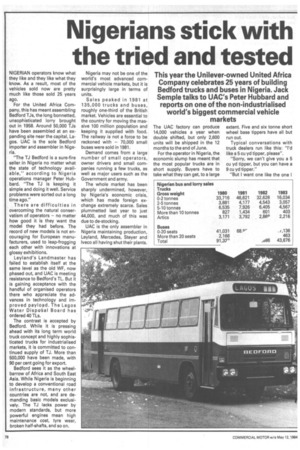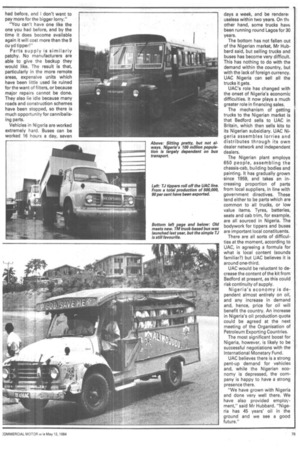Nigerians stick with the tried and tested
Page 80

Page 81

If you've noticed an error in this article please click here to report it so we can fix it.
NIGERIAN operators know what they like and they like what they know. As a result, most of the vehicles sold now are pretty much like those sold 25 years ago.
For the United Africa Company, this has meant assembling Bedford TJs, the long bonnetted, unsophisticated lorry brought out in 1958. Around 50,000 Lls have been assembled at an expanding site near the capital, Lagos. UAC is the sole Bedford importer and assembler in Nigeria.
"The TJ Bedford is a sure-fire seller in Nigeria no matter what the state of technology available," according to Nigeria operations manager Peter Hubbard. "The TJ is keeping it simple and doing it well. Service problems were sorted out a long time ago."
There are difficulties in overcoming the natural conservatism of operators — no matter how good it is they want the model they had before. The record of new models is not encouraging for European manufacturers, used to leap-frogging each other with innovations at glossy exhibitions.
Leyland's Landmaster has failed to establish itself at the same level as the old WE, now phased out, and UAC is meeting resistance to Bedford's TL. But it is gaining acceptance with the handful of organised operators there who appreciate the advances in technology and improved payload. The Lagos Water Dispotal Board has ordered 40 TLs.
The contrast is accepted by Bedford. While it is pressing ahead with its long term world truck concept and highly sophisticated trucks for industrialised markets, it is committed to continued supply of TJ. More than 500,000 have been made, with 90 per cent going for export.
Bedford sees it as the wheelbarrow of Africa and South East Asia. While Nigeria is beginning to develop a conventional road infrastructure, many other countries are not, and are demanding basic models exclusively. The TJ lacks power by modern standards, but more powerful engines mean high maintenance cost, tyre wear, broken half-shafts, and so on. Nigeria may not be one of the world's most advanced commercial vehicle markets, but it is surprisingly large in terms of units.
Sales peaked in 1981 at 135,000 trucks and buses, roughly one-third of the British market. Vehicles are essential to the country for moving the massive 100 million population and keeping it supplied with food. The railway is not a force to be reckoned with — 70,000 small buses were sold in 1981.
Demand comes from a large number of small operators, owner drivers and small companies running a few trucks, as well as major users such as the Government and army.
The whole market has been sharply undermined, however, by Nigeria's economic crisis, which has made foreign exchange extremely scarce. Sales plummetted last year to just 44,000, and much of this was due to de-stocking.
UAC is the only assembler in Nigeria maintaining production, Leyland, Mercedes, Steyer and Neu) all having shut their plants. The UAC factory can produce 14,000 vehicles a year when double shifted, but only 2,600 units will be shipped in the 12 months to the end of June.
For the operator in Nigeria, the economic slump has meant that the most popular trucks are in short supply. Buyers have to take what they can get, to a large extent. Five and six tonne short wheel base tippers have all but run out.
Typical conversations with truck dealers run like this: "I'd like a 5 cu yd tipper, please".
"Sorry, we can't give you a 5 cu yd tipper, but you can have a 9 cu yd tipper."
"But I want one like the one I had before, and I don't want to pay more for the bigger lorry."
"You can't have one like the one you had before, and by the time it does become available again it will cost more than the 9 cu yd tipper!"
Parts supply is similarly patchy. No manufacturers are able to give the backup they would like. The result is that, particularly in the more remote areas, expensive units which have been little used lie ruined for the want of filters, or because major repairs cannot be done. They also lie idle because many roads and construction schemes have been stopped, so there is much opportunity for cannibalising parts.
Vehicles in Nigeria are worked extremely hard. Buses can be worked 16 hours a day, seven days a week, and be renderei useless within two years. On tht other hand, some trucks have been running round Lagos for 30 years.
The bottom has not fallen out of the Nigerian market, Mr Hubbard said, but selling trucks and buses has become very difficult. This has nothing to do with the demand within the country, but with the lack of foreign currency. UAC Nigeria can sell all the trucks if gets.
UAC's role has changed with the onset of Nigeria's economic difficulties. It now plays a much greater role in financing sales.
The mechanism of getting trucks to the Nigerian market is that Bedford sells to UAC in Britain, which then sells kits to its Nigerian subsidiary. UAC Nigeria assembles lorries and distributes through its own dealer network and independent dealers.
The Nigerian plant employs 650 people, assembling the chassis-cab, building bodies and painting. It has gradually grown since 1959, and takes an increasing proportion of parts from local suppliers, in line with government directives. These tend either to be parts which are common to all trucks, or low value items. Tyres, batteries, seats and cab trim, for example, are all sourced in Nigeria. The bodywork for tippers and buses are important local constituents.
There are all sorts of difficulties at the moment, according to UAC, in agreeing a formula for what is local content (sounds familiar?) but UAC believes it is around one-third.
UAC would be reluctant to decrease the content of the kit from Bedford at present, as this could risk continuity of supply.
Nigeria's economy is dependent almost entirely on oil, and any increase in demand and, hence, price for oil will benefit the country. An increase in Nigeria's oil production quota could be agreed at the next meeting of the Organisation of Petroleum Exporting Countries.
The most significant boost for Nigeria, however, is likely to be successful negotiations with the International Monetary Fund.
UAC believes there is a strong pent-up demand for vehicles and, while the Nigerian economy is depressed, the company is happy to have a strong presence there.
"We have grown with Nigeria and done very well there. We have also provided employment," said Mr Hubbard. "Nigeria has 45 years' oil in the ground and we see a good future."












































































































